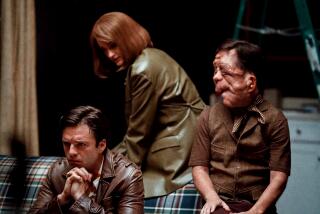Jarmusch’s Way-Out Western
Ever since his “discovery” at the 1983 Cannes Film Festival with the quirky “Stranger Than Paradise,” we’ve been able to count on American independent filmmaker Jim Jarmusch to show us something we haven’t seen before. But no one was quite ready last year when he returned to Cannes with “Dead Man,” a western that is even stranger than “Stranger Than Paradise.”
“Dead Man,” which stars Johnny Depp as a city slicker caught up in the code of the West, is just about the first black-and-white western since “The Man Who Shot Liberty Valance” and is perhaps the only western done in the true spirit of black comedy. John Ford created some bad villains in his day, but he never had one who killed men for food.
“Dead Man” got a mixed reception at Cannes, and in the long months since, Jarmusch has done some judicious editing to pick up its pace. It still moves at a glacial trot compared to conventional westerns, but only a person confusing movie blurbs with movie reviews would go to a Jarmusch film expecting tradition.
I liked the film at its original length, and I think the shortened version is Jarmusch’s best movie. Its characters are as entertainingly quirky as any he’s given us before, and his familiar themes--strangers in a strange land, lives reformed by chance encounters--are played out with much higher stakes and with greater purpose. And from Depp, Jarmusch gets the most riveting central performance of any of his films.
In some ways, “Dead Man” does sound like a familiar Hollywood western. Depp’s William Blake is the epitome of the naive, good citizen from the East lost in a world of lawlessness and mayhem. He’s a Cleveland accountant rebounding from a broken romance with dreams of a new life and future on the frontier and finding himself instead on wanted posters.
No sooner does Blake arrive in the scrappy factory town of Machine than he is drawn into a fatal shootout and put on the run, with bounty hunters and marshals tracking him into the wilderness of the Northwest. He doesn’t know where he is, doesn’t know how to live off the land, doesn’t know what to do about the bullet lodged next to his heart. To add to his anxiety, he finds himself soon adopted by a worldly American Indian named Nobody (Gary Farmer), who has him confused with poet William Blake and is talking to him as if he were already dead.
As the two head through the lush woods, staying a step ahead of Blake’s pursuers and on a course only Nobody knows for sure, Blake has to kill and kill again, his legend growing so fast, it literally precedes him. He finds posters of himself, in his familiar porkpie hat, on trees and at outposts in the middle of nowhere, with the latest updates on his escalating bounty.
Jarmusch has all sorts of ideas going on at the same time. The twisted cult of celebrity, bigotry, the duality of man’s moral nature, the thin line between life and death. But they all radiate from the notion, inherent in every Jarmusch movie, that our lives are subject to radical, instant change based on chance events and encounters.
Blake’s conversion from law abider to fugitive begins with the gentlemanly act of helping a lady up from a muddy street. He ends up spending the night with her, awakening in the morning to see her husband (Gabriel Byrne) standing in the doorway taking dead aim at them. Two bullets are fired, leaving the woman and her husband dead and the wounded Blake scrambling out the window.
The man he kills turns out to be the son of the mean-spirited factory baron John Dickinson (Robert Mitchum), who hires a trio of bounty hunters, one (Lance Henriksen) rumored by the others to be fond of human flesh, and puts them hot on Blake’s trail. Byrne is one of several familiar faces in cameo roles. We see Alfred Molina as the owner of a mountain trading post, Iggy Pop shows up as a cross-dressing prairie outlaw, and John Hurt plays the bemused office manager at Mitchum’s factory.
The showiest role, contrasting nicely with Blake’s passive nature, is Nobody, an American Indian with high spirituality, low self-esteem and nonstop patter. Claiming to have been abducted to England as a child and shown off as a savage, Nobody now wanders the woods, detached from his tribe, trying to find spiritual guidance from peyote and the poetry of William Blake.
With Neil Young’s grinding guitar score moving it along, “Dead Man” evolves into an oddly modern buddy movie, misfits united in their isolation, and in the end, has more in common with “Midnight Cowboy” than “The Man Who Shot Liberty Valance.”
But be warned. Drawing comparisons between Jarmusch’s films and any others is a dicey business.
* MPAA rating: R, for moments of strong violence, a graphic sex scene and some language. Times guidelines: very blunt violence and a scene of campfire cannibalism.
(BEGIN TEXT OF INFOBOX / INFOGRAPHIC)
‘Dead Man’
Johnny Depp: William Blake
Gary Farmer: Nobody
Lance Henriksen: Cole Wilson
Michael Wincott: Conway Twill
Mili Avital: Thell Russell
A 12-Gauge Production, released by Miramax Films. Written and directed by Jim Jarmusch. Producer Demetra J. MacBride. Editor Jay Rabinowitz. Cinematography Robby Muller. Music Neil Young. Production designer Bob Ziembicki. Costumes Marit Allen. Art director Ted Berner. Set decorator Dayna Lee. Running time: 1 hour, 54 minutes.
* In limited release at the Sunset 5, 8000 Sunset Blvd., West Hollywood, (213) 848-3500; Monica 4-Plex, 1332 2nd St., Santa Monica, (310) 394-9741; and Edwards South Coast Village, 1561 Sunflower Ave., Santa Ana, (714) 540-0594.
More to Read
Only good movies
Get the Indie Focus newsletter, Mark Olsen's weekly guide to the world of cinema.
You may occasionally receive promotional content from the Los Angeles Times.









